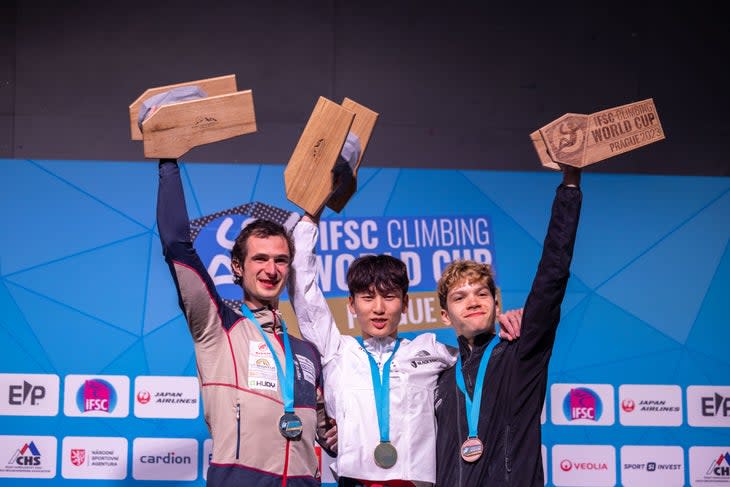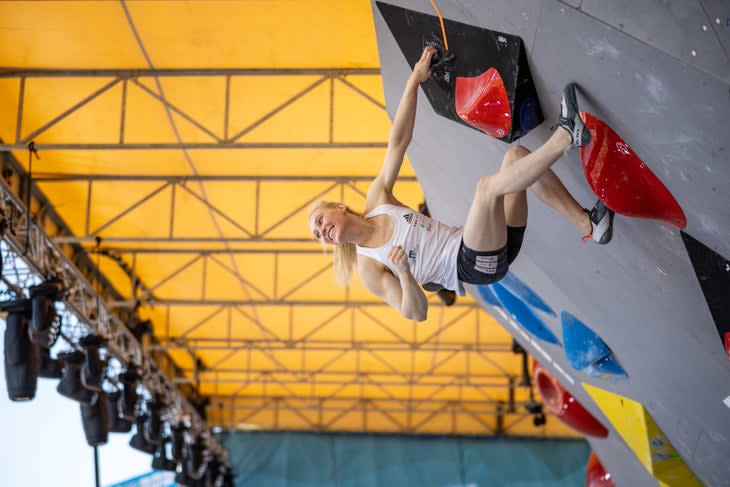Oriane Bertone Wins Her First World Cup Gold Medal; Ondra and Garnbret Return in Solid Form
This article originally appeared on Climbing
After raucous events in Asia and the United States, the IFSC rolled into Europe over the weekend with a Boulder World Cup in Prague. In fact, it was the first World Cup hosted by the Czech Republic since a Lead competition in Brno in 2009.
But in many ways, the focus for the weekend's proceedings was less on the history and the alluring setting and more on the present-day superstars. Specifically, this Prague World Cup marked the highly touted returns of the Czech Republic's Adam Ondra in the men's division (who hadn’t competed in a World Cup since July 2022) and Slovenia's Janja Garnbret in the women's division. Surrounding them was an assorted cast that included winners of previous 2023 World Cups--such as France's Mejdi Schalck and Japan's Miho Nonaka. And this all ensured that the Prague World Cup would feature some memorable battles and be a highlight of the season so far.
Here's how it all played out...
[Also read: True Fact: John Long, Stonemaster, is a Bouldering World Cup Junkie]
Lee and Ondra Fight for the Men's Crown
Whether it was "ring rust" from being away from the circuit or simply the undeniable depth of the field, Ondra was not the early standout in the men's division. Ondra topped three of the five qualification boulders, whereas several other competitors (France's Mickael Mawem and Mejdi Schalck, Japan's Tomoa Narasaki and Sorato Anraku, South Korea's Dohyun Lee, and others) topped four boulders. One competitor--Japan's Ritsu Kayotani--even topped all five qualification blocs.
Still, Ondra managed to work his way higher up the standings during the semifinals. A collection of crowd-stirring performances was highlighted by Ondra using a pistol squat to secure a rare top of the slabby fourth boulder. But even with the vocal support of the crowd, Ondra was never able to surpass South Korea's Lee, who cruised through the semifinals with three flashes and stole the spotlight along the way.

The climatic finals started with an intriguing sequence: A dyno into a cross-armed pair of crimps that was punctuated by a paddle-dyno to the top. Germany's Yannick Flohe made the sequence look fairly pedestrian and even went statically to the top instead of unveiling any paddle-dyno fireworks. Flohe's top was a prelude to quick tops by other competitors--including Schalck, Ondra, and Lee. This trend of tops continued on the second boulder, an overhead press that was flashed by most of the field. But finally the field began to separate on the third boulder--a slab that only Ondra and Lee topped.
Unfortunately, a would-be dramatic finish to the men's round was negated by a severely undercooked fourth boulder. Flashes by the entire field meant that Ondra and Lee concluded the final round with four tops apiece. As a result, the gold medal was awarded to Lee, who had fewer attempts throughout the round, while Ondra earned the silver and Schalck (with a total of three tops) earned the bronze. Despite the ho-hum finish, it was a star-making performance for Lee--his first-ever World Cup gold--and a fitting podium appearance for Ondra as the home-crowd hero.

Garnbret tested in a thrilling showdown
Separation of the women's field started early, with Janja Garnbret out-climbing everyone else in the qualification round. To that point, Garnbret's flashes on four of the qualification boulders was an intimidating statement to the rest of the field, especially considering Garnbret's long absence from the circuit due to a fractured toe.
Even in the semifinals that followed, Garnbret seemed to be on a performative level all her own. She motored through every boulder, a masterful performance highlighted by a sole flash of a slopey second boulder and a flash of a press-and-launch third boulder.

But just when it seemed that Garnbret was likely to run away with the victory, France's Oriane Bertone kicked off the final round with a quick top of a dynamic first boulder. Garnbret topped the first boulder as well, and in doing so, established an intriguing battle.
This impromptu duel between Garnbret and Bertone went into overdrive on the second boulder of the finals, a slab with sloper handholds and smeared feet. Bertone flashed the boulder, while Garnbret struggled to find a stable stance from which to launch for the top. Bertone maintained the lead by flashing the ensuing boulder--a bloc that Garnbret took four attempts to send. Bertone was not able to reach the top of the steeply overhanging fourth boulder, but a flash to the zone was enough to secure a victory. Garnbret soon flashed the fourth boulder--the only competitor to do so--but her four attempts on the previous boulder proved ever-more-costly; even with the conclusive ascent, Garnbret could not overtake Bertone on the scores and had to settle for the silver medal. The bronze medal was awarded to 22-year-old Flavy Cohaut of France, who clawed back from being near the cut in the qualification round to claim a third-place position in the semifinals and, eventually, snag two tops in the finals.

Other Takeaways
I think you could look at this event--and particularly the results of the women's finals--from two different angles: It was definitely a massive upset for Janja Garnbret to lose in her well-publicized comeback appearance on the circuit, especially considering how dominant she looked in the qualification and semifinal rounds. But there was also a rousing success story to be found in Bertone's victory, as this was her first-ever win on the World Cup circuit. Most of all, it's exciting to have irrefutable evidence that someone else--in this case, Bertone--is capable of beating Garnbret, as that will likely make each of them even better in the long run.
While we're on the subject of other people being capable of beating Garnbret, it was too bad that Natalia Grossman was not at this event, as the return of the longstanding Grossman vs. Garnbret rivalry was an initial point of interest for this competition. Brooke Raboutou and Annie Sanders were both absent from Prague as well, so fans will have to wait a little longer to see how all those American stars can do against Garnbret the Great this year.
Just a few seasons ago it felt like there was a bit of a drought when it came to French superstars. This season, however, we've seen standout performances from Mejdi Schalck, Paul Jenft, Manuel Cornu, Fanny Gibert, Oriane Bertone, and now Flavy Cohaut. It's almost like a throwback to the early 1990s, during which Francois Legrand, Didier Raboutou, J.B. Tribout, Francois Lombard, Francois Petit, Nanette Raybaud, Isabelle Patissier, Liv Sansoz, and Laurence Guyon collectively ruled over so much of the World Cup scene.
I'm not sure how to assess Adam Ondra's future trajectory and potential at this point. Apparently he has ambitions of qualifying for the Paris 2024 Olympics. Logic and statistics would tell you that will be an uphill battle: He's 30 years old and hasn't been all that active on the competition circuit lately. At times he also seems a bit lost on coordination-centered dynamic movements. On the other hand, he almost won this World Cup in Prague...and bested some competitors who were nearly half his age along the way. Adam Ondra's future endeavors on the comp scene might be among the most intriguing (and unpredictable) aspects in all of climbing right now.
The men's division provided a rollercoaster of emotions for American fans. In terms of early results, Hugo Hoyer placed 61st, Ellis Ernsberger placed 43rd, Zach Galla placed 35th, and Sean Bailey placed 23rd. All hopes thus fell upon the shoulders of Colin Duffy, the sole American to advance to the semifinals. Duffy ended up topping only one boulder in those semifinals, but he secured clutch zones on the rest of the boulders to stay in the hunt for a spot in the finals. Ultimately, it wasn't meant to be--Duffy sank to eighth place late in the semis and missed the finals' cut, somewhat of a heartbreak for the American base. But it was encouraging to see Duffy earn his highest place so far this season.
It was a shame that a venue power outage caused the livestream to lose the audio commentary of Matt Groom and routesetter Cody Grodzki during the climax of the men's semifinal round. Groom and Grodzki had great chemistry and Grodzki was delivering some fascinating routesetting insights at the time.
A small moment that deserves more recognition: Yannick Flohe ran out the clock on the third boulder in the men's final round by scrupulously brushing the holds for the next competitor--Adam Ondra. That was some cool sportsmanship by Flohe, and it undoubtedly endeared him to the Czech crowd.
The micro-beta theme for this event seemed to be thumb work. We saw thumb-catches at the top of the second boulder in the women's semifinals and the second boulder in the men's finals, a thundercling/thumbdercling at the top of the slab in the women's semifinals, and other subtle, thumby stuff in other rounds. Perhaps most impressive were the sends in which the thumb-catches were totally ignored--such as Dohyun Lee's monster flash on that second men's boulder.
Consider me a fan of the smoke machines that were used for the final round. Maybe we could see some pyrotechnics next time. Instead of just running through smoke, could the finalists also run past some colorful flames? Maybe a crackling comet or two? Fireworks? Lasers? I'd be into it all.
Results
Men
Dohyun Lee (KOR)
Adam Ondra (CZE)
Mejdi Schalck (FRA)
Yoshiyuki Ogata (JPN)
Yannick Flohe (GER)
Jan-Luca Posch (AUT)
Women
Oriane Bertone (FRA)
Janja Garnbret (SLO)
Flavy Cohaut (FRA)
Miho Nonaka (JPN)
Stasa Gejo (SRB)
Futaba Ito (JPN)
For exclusive access to all of our fitness, gear, adventure, and travel stories, plus discounts on trips, events, and gear, sign up for Outside+ today.

